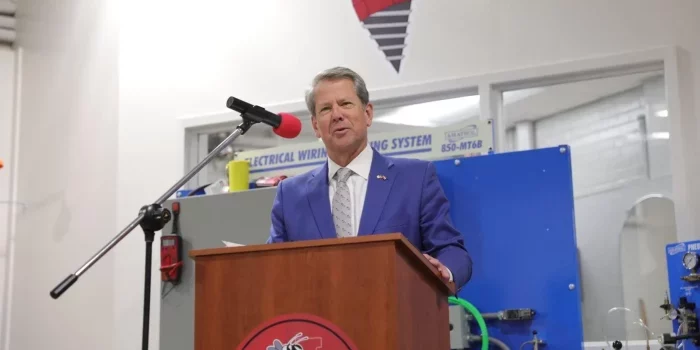() Georgia Gov. Brian Kemp signed an election reform measure that supporters hoped would close many of the loopholes exploited during the notorious 2020 race, even as evidence from a state hearing confirmed that foul play likely delivered the results of that race to Democrat Joe Biden.
Yet, with feckless and dishonest officials, including Secretary of State Brad Raffensperger, still controlling the mechanisms for administering the election, questions remained as to whether the raft of reforms would proove toothless in November.
BREAKING: Georgia Governor Brian Kemp signed THREE huge election integrity bills into law today. Election fraudster Marc Elias is pissed which means this is great news for election integrity
House Bill 974: Adds watermarks to ballots, displays ballot pictures online, requires… pic.twitter.com/817kwAFm1E
— George (@BehizyTweets) May 8, 2024
Moreover, anti-integrity lawfare activists such as Steele Dossier architect Marc Elias promptly threatened to do all they could to undermine the state legislature’s efforts by leveraging the court system against it.
Senate Bill 189—updating the earlier SB 202, the Election Integrity Act of 2021—removed the secretary of state from the State Election Board, instilling at least the semblance of oversight and accountability for Raffensperger’s office.
It also barred local election officials, elections board and employees in the secretary of state’s office from securing state contracts specific to voting equipment—a concern that arose due to the nebulous influence that Dominion Voting Systems had and outrage over reports that its software may have been vulnerable to hacking.
The new legislation also set deadlines for submitting absentee ballots, established additional ballot chain of custody rules starting in 2025 and eliminated QR codes on ballots starting in 2026.
“SB 189 is a testament to our commitment to restoring faith in Georgia’s elections,” state Sen. Max Burns, R-Sylvania, said in a statement.
“Building upon the solid foundation laid by Senate Bill 202 in 2021, we continue to prioritize integrity and accessibility,” Burns added. “By championing transparency and accountability, we pave the way for fair elections that uphold the voice of every Georgia citizen.
SB 189 also requires all advance and absentee ballots to be counted within an hour of polls closing.
Moreover, it allows a political party’s presidential candidate to qualify for Georgia’s ballot if the individual has secured access in at least 20 other states or territories.
“Although there is always more work to be done, our new laws will ensure even more accuracy, safety, and transparency,” Kelly Loeffler, chairwoman of Greater Georgia and a former Republican U.S. senator, said in a statement.
“On the eve of a presidential election, Georgians deserve to have confidence that—despite the best efforts of liberal activists in our courts, our media, and our federal government—their votes will count.”
Loeffler lost her 2021 runoff race against Raphael Warnock under suspicious circumstances, delivering control of the Senate to the incoming Democratic administration.
Even though the new laws relieved Raffensperger of some of his authority and likely meant more oversight of his office, he too lauded the measure and promised to push for funding for the new requirements.
“Georgia is already a national leader in election integrity and security, and we congratulate Gov. Kemp and the General Assembly on the passage of the additional election integrity measures contained in this bill,” Raffensperger said in a statement to The Center Square.
“As my office continues to lead on ensuring free, fair, and accurate elections, I look forward to working with the General Assembly and Georgia counties next session to make sure that the changes the legislature put in place are fully funded,” he claimed.
The most controversial provision in the new laws was, perhaps, an expansion of the ability to challenge and potentially remove ineligible voters from the voter rolls.
Despite reports in recent election cycles that dead voters and out-of-state voters had received applications for absentee ballots, some on the Left continued to insist that the possibility of disfranchising active voters outweighed concerns over illegitimate votes dilluting those of legally registered and verified voters.
The ACLU of Georgia said it planned a legal challenge.
“SB 189 is a step back for voters’ rights and voting access in the state of Georgia,” Andrea Young, executive director of the ACLU of Georgia, said in a statement.
“Most importantly, this bill will require already overburdened election workers to spend time processing unnecessary voter challenges,” she complained.
She suggested that maintaining the integrity of the election was, at best, a secondary responsibility to ensuring customer satisfaction.
“As always, elected state officials should work to make voting easier and not more difficult for Georgia citizens,” Young claimed. “We are committed to protecting Georgia voters and will see the governor in court.”
In a statement, Tolulope Kevin Olasanoye, executive director of the Democratic Party of Georgia, called the signing “a slap on the back to MAGA conspiracy theorists like his [Kemp’s] lieutenant governor who refuse to accept President Biden won in 2020.”
The Trump-endorsed Burt Jones was elected lieutenant governor in 2022 after NeverTrump fraud-denier Geoff Duncan declined to run for re-election.
Headline USA’s Ben Sellers contributed to this report.

